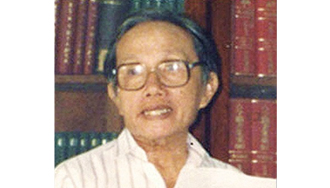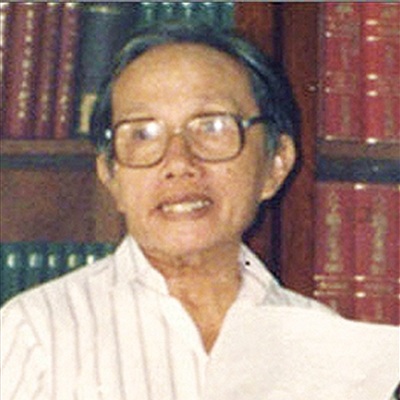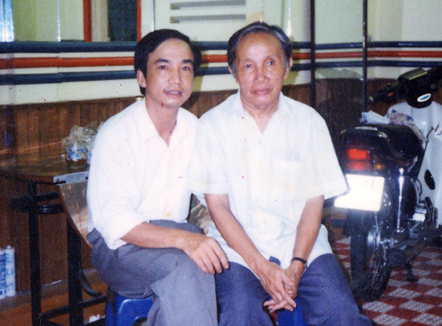
I remember, he was short and stout, his face was thoughtful and quiet. He spoke softly as if he was listening to himself while he was speaking. He rarely smiled, but when he did, it was very bright, his eyes were distant and sparkling... Following my friends, I sometimes visited him and quietly observed. Before, I did not know clearly, but since I knew him - both as a student and later as a lecturer - I saw that "around him" were not the beauty queens, the pretty girls among the female students, but a "group of poet monkeys" of the faculty with eccentric features from their costumes, gestures to "speeches". He welcomed them openly and intimately, and they also spoke to him enthusiastically and "very democratically". They read poems, sometimes with half-closed eyes, passionately, sometimes whispering, sometimes shouting, gesturing like actors on stage. He listened attentively and "tolerated" happily.

Professor, People's Teacher Le Dinh Ky (1923-2009) - Head of the Department of Literary Theory and Vietnamese Literature, Faculty of Philology (1971-1976).
I remember, it wasn't until the fourth year that we got to study the subject.The Tale of Kieu and Nguyen Du's Realism– a topic that has been printed into a book, very attractive, simply put, reading it over and over again without getting bored. That is the common feeling of many people, not only for “literary people”. Ms. Sinh – graduated from the University of Economics and Planning, wife of Mr. Le Chi Dung – at that time a young lecturer of the Faculty of Literature, the same generation as Mr. Le Chi Que, Mr. Nguyen Thien Giap, Mr. Dinh Xuan Dung … is such a “fan”. Because Mr. Dung was the homeroom teacher, and also a fellow Quang Binh native, I sometimes went to his house to visit. Once I saw Ms. Sinh holding a book in her handThe Tale of Kieu and Nguyen Du's Realism, while reading, she kept praising: “Thu, why does Mr. Ky write so well? I have read it many times, the more I read, the more I like it!”. While excited, she suddenly became thoughtful, her voice dropped: “Mr. Ky’s salary now is enough to buy a chicken every week to improve me, right?”…
Besides the famous monograph of that time, he also wrote a textbook on literary theory:Artistic method –1962,Literary theory– 1971; writing critical essays and literary research:The Way to Poetry- 1969,Poetry with Xuan Dieu, Hoai Thanh, Che Lan Vien –1988,New Poetry – Ups and Downs –1989 etc... His forte and advantage is researching and criticizing poetry. Writing about any author, whether old or young, whether already famous or just starting out; from To Huu to Pham Tien Duat, from Che Lan Vien to Thai Giang, from Te Hanh to Luu Quang Vu... (The Way to Poetry), he writes with all his heart and soul, with all his thoughts and feelings, with both clarity of thought and sensitivity of intuition. His works are always revelatory in their talented, subtle and extremely profound writing style. Especially, through typical portraits such as The Lu, Luu Trong Lu, Xuan Dieu, Huy Can, Han Mac Tu, Nguyen Binh, Che Lan Vien, Vu Hoang Chuong, Bich Khe...(New Poetry – (Ups and downs)Professor Le Dinh Ky has revived a brilliant poetic era, unique in the flow of Vietnamese poetry of the 20th century.
Perhaps because he is more introverted, his lectures are “strong but not intense”, or he tries to lead the listeners – students – into the depth of the content of the problem without paying much attention to the excitement, or something a bit more formal for the “young and young at heart” students, who often only pay attention to the way he dresses and gestures rather than listening to the lecture. If you focus on listening and broadening your “expectation” when studying Mr. Ky’s subject, you will reap many useful and new things. For example, when teachingThe Tale of Kieu, to the part where Nguyen Du describes the "natural beauty" couple Kim Trong and Thuy Kieu meeting and falling in love, to the verse: "The one who looks directly at the other's face is afraid to bow his head",The teacher paused for a long time to explain and interpret all the beauty and cleverness of Nguyen Du in portraying a portrait of a couple of lovers who were so infatuated with each other (with the sign of "Seeing in the caress, there was a flirtatious side"). According to the teacher, a virtuous girl, when sitting opposite the person who was infatuated with her, when the man "bent down to look directly at her face", the woman had to "bend her head" but at that time, if she "glared up", it would be inappropriate! Until now, I still have not forgotten those humorous, gentle, yet profound analysis of the teacher. And I "realized" that: it was true that Nguyen Du had chosen for the character Thuy Kieu in those moments of time and in that space of love between the couple a very graceful posture, very Asian in color.

Professor Le Dinh Ky with his students at his home
In December 1976, thanks to the arrangement of language professor Nguyen Lai, who was teaching at a university in the German Democratic Republic at the time, he went abroad for less than a month. At that time, I had just gotten married and was having difficulty finding a place to live. He called me up and said: “Life is only once. Come to my house and live in a bright and spacious place. I will be in Germany for about three weeks. During that time, the dormitory and the administration office will probably finish arranging a house for you.” I was very surprised, I could only bow my head to thank him to hide the tears that were about to fall… When he returned from Germany, he told me that he had bought dozens of bicycle spokes, he was very happy because this item was very rare in the country, but he did not expect that they were spokes for children's bicycles (it seems that at that time they were not called mini bicycles), and we did not have this type of bicycle. Then he took a rosy, fragrant “apple”, carefully cut it into many pieces, placed it on a plate with a “poetic” and “very flattering” invitation: “Here, sir, is a little taste from faraway Siberia…”. It was the most luxurious fruit I had ever tasted at that time. And until now, I have never seen such a delicious apple!
I remember, Mr. Le Dinh Ky lived a very honest and simple life, far from anything formal, colorful, or frivolous. Although it was short, during my time at the Faculty of Literature, University of General Sciences, with his dedicated guidance, I took my first steps into the profession that I now love very much but at that time I was only afraid of. The first class observation to get comments on my lecture was attended by big names: Professor Hoang Nhu Mai, Professor Le Dinh Ky, Professor Phan Cu De, Professor Ha Minh Duc... Looking down from the podium, my "heart was pounding and my legs were shaking", my speech was hesitant and stammering. After the lecture, Mr. Hoang Nhu Mai whispered to Mr. Ky: "He lectured as if a student was talking to the teacher"! I secretly admired Mr. Hoang Nhu Mai's insight. Indeed, at that time, I forgot the content of the lecture, forgot the order of the presentation, even forgot the dozens of students sitting in front of me (among them were quite a few older men who had returned from the battlefield, whom I usually "respected"), and only saw the towering shadows of the teachers... But my beloved teachers were all "noble-hearted", giving me sincere and valuable comments, helping me to be more confident before the long and arduous road that I had to overcome. Mr. Ky encouraged and advised me a lot, he showed me how to read and take notes, how to "go with both feet": teaching and researching, specifically, having to invest in lectures in class and at the same time start writing research criticism. The teacher especially noted and repeatedly reminded me: “You must remember that writing poetry criticism is very difficult, but the most difficult thing is to hide the theory, to let it dissolve into the analytical perception” and added: “There is nothing more awkward than writing poetry criticism where the theory is all exposed, dry, rigid…”. What I have gained in my later research works and critical essays all originate from those valuable introductory lessons, from those experiences and profound “philosophy” of the teacher. The teacher’s attention and guidance are often not “big and heavy” but still contain both theoretical and practical meanings. And more importantly, it helps researchers make appropriate choices. More deeply, it is the aesthetics of poetry criticism research and a cultured way of behaving, a way of “playing fair” towards poetry in particular and literature in general.
Because he was so engrossed in his work and it seemed that every time I went home, he would find him working hard on a desk full of books and reference materials (but still scientific and with his own "logic" as he explained when he met those who questioned the mess), he was often very busy, the time when he had to cook was also his free time for "entertainment" (also in his joking way of saying), even so, he still spared no time to discuss his expertise, about the authors and works that he was interested in. At those times, he looked lively and animated, his thoughtful, thoughtful look was replaced by a comfortable smile. During one such conversation, I mentioned the scientific paper entitledYouth, revolution and poetryof the teacher, in which there is a vivid, colorful paragraph describing the artistic space of Truong Son - the cradle of the generation of poets who fought against the US to save the country, which I know very well: "Truong Son in the rain of thousands of waterfalls and floods, in the blazing sun and Lao wind, in the howling bombs and bullets...". After listening, the teacher calmly said: "Ah, I "stole" from a "hand" student who is an armed police officer in his final year at that faculty, how could I write... I have to live and die with Truong Son to be able to write like that". I understand that it is just a way of speaking, and it is the teacher's sincerity that makes the story more and more interesting and sincere. Not only me but many people share the same feeling that talking to teacher Le Dinh Ky does not require pre-emptive measures, does not require careful consideration of each sentence and each word. Over time, those conversations always evoke a warm, carefree period of life. Those are memories I will never forget.
I remember, when I received my doctoral thesis on "Xuan Dieu's Poetry before the August Revolution - 1945", throughPoetry poetryandSend fragrance to the wind"From far away Saigon, he sent me some books, (in whichNew Poetry – Ups and DownsandPoetry with Xuan Dieu, Hoai Thanh, Che Lan Vienhas become a necessary tool for me to read and ponder) and again advised and reminded me to think deeply, not to repeat others, to find the unique color of "Xuan Dieu's ego" and the difference between nature - soul in New Poetry and nature - country in post-1945 revolutionary poetry. Knowing that Professor Ha Minh Duc accepted me to guide my thesis, he shared: "That's great. Duc is very knowledgeable in this field. The topic is good but not easy to write, it requires a lot of effort." Before the official defense day, I sent a summary of my thesis for him to read and anxiously awaited the weighty assessments from a leading expert on New Poetry. And unexpectedly, he read it very quickly and sent me a review via fax with compliments full of favor and encouragement. That was beyond my expectations because for me, having him read it was precious, I didn't dare to think that he would even write a review for me. I called him and choked up with emotion, thanking him. The teacher seemed very happy with the initial results of his former student. Then he asked me how many magazine articles I had, so I should gradually publish some parts of the thesis before printing it into a monograph. In addition, I still had to write more because, whether I wanted to or not, in a university teaching position, after finishing my Associate Doctorate thesis (at that time it was not called a Doctorate), I had to prepare for my Associate Professor profile... Now, sitting and rereading the review dated October 24, 1995 with the tiny, slanted handwriting that I have cherished and kept for decades as a precious keepsake and remembering those words of advice from the teacher, my eyes filled with tears. I owe him so much but have never once repaid him...
In my mind, Mr. Le Dinh Ky is an exemplary scientist: combining the erudition and elegance of intelligence with the depth and subtlety of emotions, between sharp thinking and sharp intuition. In my feelings: He is a master with a big heart, kind, generous and tolerant. Every time I remember him, I feel like I am reliving the noble, warm and gentle teacher-student relationship. That is a peaceful sky, full of love for life, love for people, an indelible memory that always comes back and warms me.
Hanoi, April 11, 2014
|
PROFESSOR, PEOPLE'S TEACHER LE DINH KY
+ Working unit: Faculty of Philology, Hanoi University of Science. + Management position: Head of Department of Literary Theory and Vietnamese Literature (1971-1976).
Artistic method.Education Publishing House, Hanoi, 1962. The Way to Poetry Literature Publishing House, Hanoi, 1969 The Tale of Kieu and Realism.Social Sciences Publishing House, Hanoi, 1970 Literary theory- Episode 4. Education Publishing House, Hanoi, 1971. To Huu's Poetry.Literature Publishing House, Hanoi, 1979 Study literature.Literature Publishing House, Ho Chi Minh City, 1984 New Poetry, Ups and Downs.Ho Chi Minh City Publishing House, 1988 Poetry with Xuan Dieu, Che Lan Vien, Hoai Thanh. Cuu Long Publishing House, 1988. The problem of romanticism in modern Vietnamese literature.Education Publishing House, Hanoi, 1998.
+ State Prize for Literature and Arts in 2001. |
Author:Associate Professor, Dr. Ly Hoai Thu